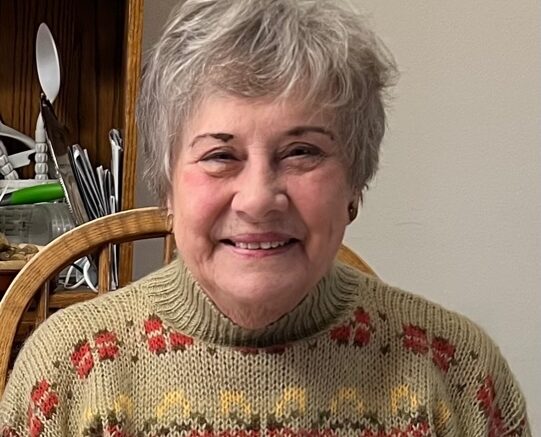This month we would like to highlight Jackie Christner. She is currently on the JONAH board and a member of the Mental Health Task Force and the Chippewa Valley Justice Action Team. Learn all about Jackie and her involvement with JONAH throughout the years.
- How did you get connected to JONAH?
JONAH has been an important part of my life since its founding in 2007. My introduction was as a founding member of our First Congregational UCC JONAH Core Team, chaired then and ever since by Paul Savides. He and I attended week-long Gamaliel training together at a monastery near Chicago, where we learned so much about ourselves and organizing. As we learned of issues important to our congregations and ourselves, through a series of listening sessions and one-on-ones, we formed task forces.
The first task force I worked with was Health Care Reform, when we worked to get universal health care, mental health equity in insurance coverage, and then to congregants to write post cards to national legislators, asking for votes I to include a number of items in the Affordable Care Act. After the ACA passed, our task force disbanded, but I was already working with TIP (Treatment Instead of Prison) for people with mental health and/or addiction issues.
2. Where does your passion come from?
Since I had a son who had developed schizophrenia and a history of ADHD and depression that led to behaviors resulting in incarceration, I was especially eager to see a change in our courts from punishment to treatment. Our county’s Drug Court had just been created, but we needed more. Jill Christopherson was our JONAH president then, as well as a member of our First Congo JONAH Core Team, and had been asked for someone from JONAH to join a group at DHS who were working to create a Mental Health Court. She suggested me, so I accepted and went to work with the group to create our Mental Health Court. Once it was up and running, my son was accepted into their program, then administered by Mary Van Roy, who did a wonderful job with my son Ryan. He was in his second year and doing well, until New Year’s Eve/Day 2010, when he died from an overdose of his prescription opioid medication for pain.
Today is the 12th anniversary of his passing. To me, it seems like yesterday.
I still serve as the JONAH representative on the Eau Claire County Treatment Courts Collaborative, a group of professionals involved in and concerned about the success of the four county treatment courts.
3. What are some highlights of your work with JONAH?
Besides serving on the JONAH Board as one of two First Congo representatives (Paul Savides is the other) for more years than I can remember, I have worked with the JONAH Criminal Justice Reform Team for many years, working for more funding for treatment courts and for programs for incarcerated citizens, especially transition programs to become successful in the community after incarceration. Another group I worked with from 2008 on, as a result, was a Day-Report Planning Committee, a sub-committee of the Criminal Justice Collaborative Council, in an effort to implement innovative and creative evidence-based programming to enhance the criminal justice system with comprehensive rehabilitative treatment to enable successful participation in a safe community. The result of our work was the LSS Community Transition Center, where I served on the CTC Advocacy Board until 2018 as the JONAH representative.
This last year my focus has been on two new JONAH task forces: the Mental Health Task Force (MHTF) and the Chippewa Valley Justice Action Team (CVJAT). In both we have learned so much by reaching out to others about the importance and efficacy of peer support programs. We will advocate for more funding for the existing programs and to expand these programs to underserved individuals. My JONAH Core Team and I presented a virtual forum on peer support, which was well attended. You can view it here. I believe that my son could have been saved by one of these programs, and that keeps me working for others like him who would benefit from a certified peer support specialist. We in the MHTF are working to end or at least lessen the social stigma of mental health issues by implementing the Green Bandana Project. We collaborate with several groups.
The CVJAT members have been discussing different project possibilities for projects involving poverty, mental health, and incarceration issues. We have considered working the arts into programs dealing with these issues, as well as peer support and collaborating with partners.
4. What do you love most about JONAH?
What I love most about JONAH is working with people who are dedicated to making the world a better place for people who struggle. These are people motivated by love for humanity and democracy, and I am proud to know them. I am now 78 years old and losing energy, but I will continue as long as I can to stay involved in making a difference. I just pray that we can continue to involve younger people to continue the work and expand it until we have social justice for all. Every step of every issue will need compassionate and passionate people who share our values of empowering people in addressing the root causes of social injustice in our and the greater community.
5. What is your message to younger volunteers?
Stay engaged!
6. What hobbies do you enjoy?
I read a lot of books about social justice issues and love getting together with friends, especially my book club, my church Covenant Group, and my French Group. I also watch a lot of politics on TV and am politically active.
7. What is your favorite local business to support?
Shanghai Bistro, Festival Foods, McMahon Chiropractic, and Korean Egg Rolls.

